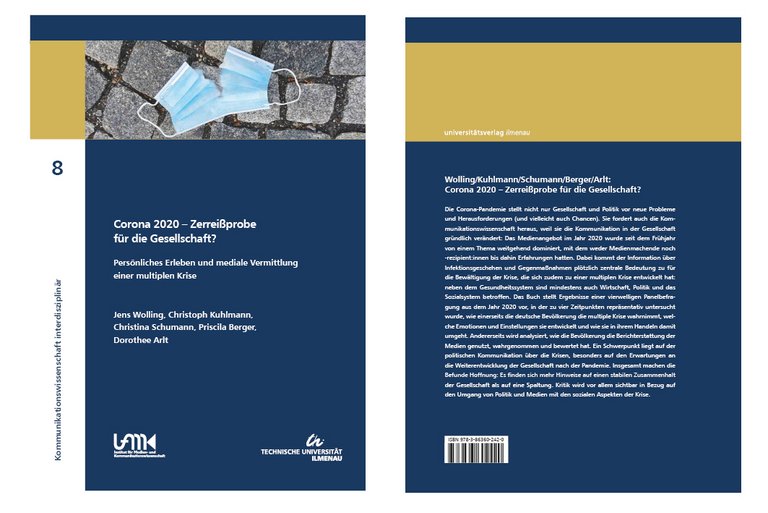In a recent book publication, communication scientists at TU Ilmenau have examined the role of the media in dealing with the Corona crisis. Their research results show that the population's assessment of the media's coverage of the crisis is predominantly positive.

According to the researchers, this finding is anything but self-evident, since media scolding and, in some cases, open attacks against journalists have increased in recent years. However, even during the crisis, the vast majority of the population has confidence in the media and considers the reporting to be correct. The research team's evaluations make it clear that throughout the first year of the crisis, the journalistic media succeeded in providing citizens with credible information and largely met their expectations. According to the Ilmenau researchers, this achievement is also of great importance for society's ability to cope with the crisis.
Four surveys on media coverage
The book's findings are based on analyses of a four-wave panel survey conducted in 2020, in which representative studies were conducted at four points in time to determine how the German population perceives the multiple crisis, what emotions and attitudes it develops, and how people behave in the face of threats and constraints. In addition, the study analyzed how the population used, perceived and evaluated media coverage.
A multiple crisis that permeates all areas of public life and does not even stop at people's private lives can become a dangerous explosive for social cohesion. An incalculable crisis of the health care system combined with the danger of a severe economic recession, considerable social upheavals and massive encroachments on previously self-evident rights of freedom form a dangerous cocktail even for a relatively stable democracy. Despite this explosive situation, "society in Germany held together to a large extent during the first year of the crisis," the Ilmenau scientists conclude. However, there were also some critical points, especially with regard to the social aspects of the crisis: the majority of those surveyed said that politicians were doing too little and the media were reporting too little.
Expectations for further development after the pandemic: social justice and environmental protection
Another focus of the survey was on expectations for the further development of society after the pandemic. The evaluations show a great deal of agreement that the Corona crisis should be used for social change. The greatest agreement is found in a draft for the future that focuses on improving our lives in a modern, developed society. Better education and health care systems, fast Internet and (with some reservations) a boost in consumption are among them. Almost on a par with this vision of the future, however, is the approval of a policy of socio-ecological renewal: greater social justice, more environmental protection and clear limits to an unbridled market are the central components of this vision of the future.
As early as 2020, this clearly outlined the political tension that will shape the next federal election. By contrast, backward-looking positions of populist revisionism will find far fewer supporters. A policy of isolationism and the ideologically motivated overemphasis of individual rights over collective responsibility are not capable of gaining majority support in Germany.
According to the Ilmenau scientists, the Corona pandemic has the potential to trigger a social awakening that could help to break down social encrustations.
The book, written by Prof. Jens Wolling, Privatdozent Dr. Christoph Kuhlmann, Dr. Christina Schumann, Priscila Berger and Dorothee Arlt, has 139 pages and was published by Universitätsverlag Ilmenau as volume 8 of the series "Kommunikationswissenschaft interdisziplinär". It is available free of charge online at: https://doi.org/10.22032/dbt.48770.
Contact
Prof. Jens Wolling
Head of the Group for Media Research and Political Communication

